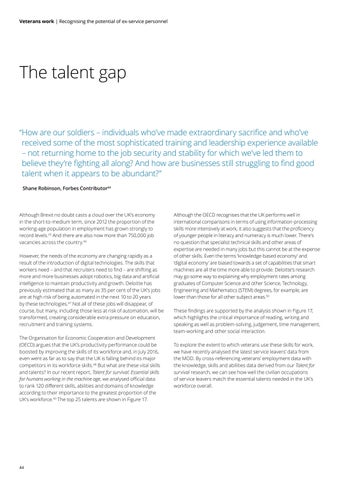Veterans work | Recognising the potential of ex-service personnel
The talent gap
“ How are our soldiers – individuals who’ve made extraordinary sacrifice and who’ve received some of the most sophisticated training and leadership experience available – not returning home to the job security and stability for which we’ve led them to believe they’re fighting all along? And how are businesses still struggling to find good talent when it appears to be abundant?” Shane Robinson, Forbes Contributor44
Although Brexit no doubt casts a cloud over the UK’s economy in the short-to-medium term, since 2012 the proportion of the working-age population in employment has grown strongly to record levels.45 And there are also now more than 750,000 job vacancies across the country.46 However, the needs of the economy are changing rapidly as a result of the introduction of digital technologies. The skills that workers need – and that recruiters need to find – are shifting as more and more businesses adopt robotics, big data and artificial intelligence to maintain productivity and growth. Deloitte has previously estimated that as many as 35 per cent of the UK’s jobs are at high risk of being automated in the next 10 to 20 years by these technologies.47 Not all of these jobs will disappear, of course, but many, including those less at risk of automation, will be transformed, creating considerable extra pressure on education, recruitment and training systems. The Organisation for Economic Cooperation and Development (OECD) argues that the UK’s productivity performance could be boosted by improving the skills of its workforce and, in July 2016, even went as far as to say that the UK is falling behind its major competitors in its workforce skills.48 But what are these vital skills and talents? In our recent report, Talent for survival: Essential skills for humans working in the machine age, we analysed official data to rank 120 different skills, abilities and domains of knowledge according to their importance to the greatest proportion of the UK’s workforce.49 The top 25 talents are shown in Figure 17.
44
Although the OECD recognises that the UK performs well in international comparisons in terms of using information-processing skills more intensively at work, it also suggests that the proficiency of younger people in literacy and numeracy is much lower. There’s no question that specialist technical skills and other areas of expertise are needed in many jobs but this cannot be at the expense of other skills. Even the terms ‘knowledge-based economy’ and ‘digital economy’ are biased towards a set of capabilities that smart machines are all the time more able to provide. Deloitte’s research may go some way to explaining why employment rates among graduates of Computer Science and other Science, Technology, Engineering and Mathematics (STEM) degrees, for example, are lower than those for all other subject areas.50 These findings are supported by the analysis shown in Figure 17, which highlights the critical importance of reading, writing and speaking as well as problem-solving, judgement, time management, team-working and other social interaction. To explore the extent to which veterans use these skills for work, we have recently analysed the latest service leavers’ data from the MOD. By cross-referencing veterans’ employment data with the knowledge, skills and abilities data derived from our Talent for survival research, we can see how well the civilian occupations of service leavers match the essential talents needed in the UK’s workforce overall.


